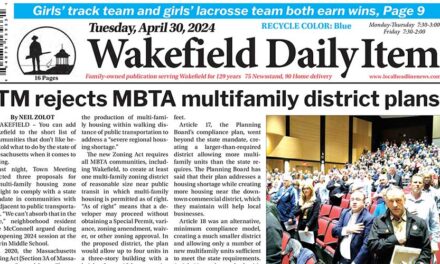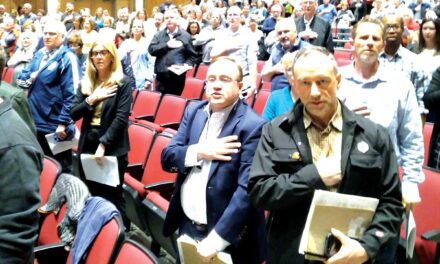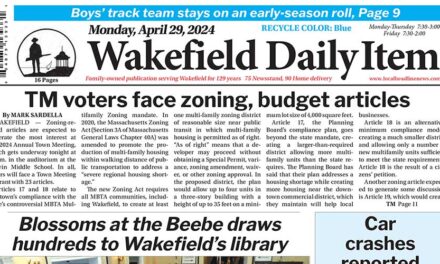WAKEFIELD — Four candidates are running for three positions on the Town Council in the April 23 Town Election. Incumbents Anthony Longo, Peter May and Ann McGonigle Santos are seeking re-election. Challenger Jonathan Chines is attempting to win one of those seats in his first run for local elective office.
The Daily Item posed the same two questions to all of the candidates. Today, we publish their responses to the first question.
QUESTION:
This year, the DPW requested $1 million in town funds to supplement Chapter 90 state funds for road work. The Town Council reduced that amount to $500,000. What amount should the town appropriate for local roads?
JONATHAN CHINES: As a member of the Finance Committee, I have supported increasing funding for road maintenance and resurfacing for the last two years, above and beyond the Town Council’s recommendation. I supported increasing funding to $500,000 last fiscal year (compared to $350,000 approved by Town Council), and $750,000 for the coming fiscal year (compared to $500,000 approved by Town Council). Given the average life cycle of a road and our annual expected Chapter 90 funding from the Commonwealth, we should be appropriating approximately $1 million each year for road reconstruction.
However, more money isn’t sufficient by itself. We need to offer better customer service to residents, by utilizing and promoting telephone and electronic options that allow residents to easily report poor road conditions and analyzing the data around reported problems to better identify repair needs. In addition, we must do a better job of developing a long-term plan for road maintenance and communicating repair priorities with residents.
ANN McGONIGLE SANTOS: I supported appropriating $500,000 in supplemental Chapter 90 money as opposed to the $1 million requested. I understand and respect the Director of the DPW requesting $1 million – he understandably wants as much money as possible to complete the many road projects under consideration. Historically, the State provided all roadway funds through Chapter 90; now the State only supplies one-third of what is required. Because of this discrepancy, the Town Council began supplementing Chapter 90 funds, with $500,000 last year and $500,000 this year. Still, we would need approximately $2.1 million to fix all six miles of road per year within a perfect schedule.
As a Town Councilor, this is one of the difficult decisions we face in deciding which specific requests that go above level funding we support, and which we don’t, knowing that we have many important needs to address.
That said, I believe we could meet in the middle with a compromise of $750,000 It would be easy to vote to appropriate money for all requests by departments – the requests are never trivial and always seek to address an issue that benefits all residents. However, as a Councilor I must consistently look towards the future and consider that we may not always be as financially solvent as we are today, buoyed by a strong economy. As a Councilor I must be mindful and not cavalierly reduce our reserves because I think a project is important, as they mostly are. But upon reflection I could support a request of $750,00.00 this year for our roadways.
PETER MAY: This is a great question. Everyone sees that many of the roads in town need some work. Some need a great deal of work or total replacement.
This is a balancing act with our overall budget. Like all the budget items we address as a Town Council, when you add tax dollars to one side of the balance sheet, you need to remove those same dollars from another area. It would be nice to fix all the roads at one time but that does not make any fiscal sense. We must keep our AAA Bond rating and a good cash flow in our general funds, etc.
Road bonds don’t work either because we would pay interest & fees on money we could not use at one time. The DPW & Gas & Light Utility need to coordinate all their road work every month, which would not work with a road bond.
The DPW Advisory Board wanted $1million. The Town Council & Town Administrator wanted a level funded budget at 500K. The Finance Committee wanted 750K.
At the Town Council meeting on April 8 we discussed the money to be allocated to the road work in town. Everyone had feelings about the right amount but no one really knew the facts about the 90 miles of public roads.
The key question is which roads are in need of immediate repairs/repaving and which can wait?
Ed Dombroski came up with a reasonable solution to the problem.
We are having the roads in town color coded (on a map) based on the urgency of repairs needed. We will have this ready for Town Meeting on April 29, so the town can ultimately decide how much we will allocate to the road work. We will be able to see if 10 percent, 30 percent or 50 percent of the roads need immediate repairs or replacement by the report.
Per Mr. Stinson, the town would need about $2.1 million to invest annually to stay ahead of the road work needed. In the past, the state used to supplement all funding for road repairs. Now the state pays for about 30 percent of our town’s needed road repairs. That equates to about $673,000 this year coming from the state, leaving Wakefield with about $1.4 million to allocate towards the roads on our own.
At the end of the day, we will probably need closer to $750,000 this year to really start making a noticeable difference on the roads in our town.
Safety is a critical issue for me in regards to road repair and that is a priority for me over the next 3 years.
We can afford to adjust the budget to make the $750,000 a reality for road repairs and not cause any major issue with the budget.
Come to the Town Meeting on April 29 and let your voice/vote be heard.
TONY LONGO: It costs approximately $350,000 to pave one mile of road in Wakefield, and according to the DPW Director, he needs approximately $2,100,000 to keep pace. That is quite a shortfall. We absolutely could use more state assistance to meet that objective through additional Chapter 90 funding. I already possess the experience and have solid relationships with all three of the Town’s State Legislators and will make this a priority if reelected on April 23.
Various Committees and Boards asked for additional funding for road repaving. However, Town Council, on the advice of the Town Administrator, level funded this at $500,000. Can Wakefield afford to go up a couple of hundred thousand dollars to repave roads? Yes, but we also want to keep the Town’s positive cash flow. We cannot go down the road of some of our neighboring communities and have a proposition 2½ override vote to pay day to day bills.
There has been the suggestion by some to bond a repaving project, but that costs the town additional money via interest and fees associated with any type of bonding project. Please keep in mind that with every road paving project, there must be coordination with the WMGLD. This ensures that if a road is repaved, we don’t tear it up two years later to install new natural gas lines (about two miles of new lines every year). Another problem is that there is probably not enough capacity to have every road paved within a short period of time because of the prior reason.
In 2019-2020, National Grid will be repaving 2.4 miles of roads and installing new gas pipelines within Wakefield out of their own pocket when they install upgraded transmission lines. They will also be clearing and paving another mile on the rail to trail project because of the same initiative.




